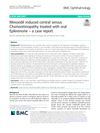 22 citations,
December 2017 in “International Journal of Molecular Sciences”
22 citations,
December 2017 in “International Journal of Molecular Sciences” Minoxidil boosts hair growth by increasing blood flow and nutrients to hair follicles.
 March 2021 in “bioRxiv (Cold Spring Harbor Laboratory)”
March 2021 in “bioRxiv (Cold Spring Harbor Laboratory)” Removing a specific gene in certain skin cells causes hair loss on the body by disrupting normal hair development.
 35 citations,
October 2017 in “Trends in Molecular Medicine”
35 citations,
October 2017 in “Trends in Molecular Medicine” Mice with enhanced regeneration abilities may help develop new regenerative medicine therapies.
 10 citations,
November 2022 in “Protein & Cell”
10 citations,
November 2022 in “Protein & Cell” Quercetin significantly helps hair growth by activating hair follicles and improving blood vessel formation around them.
Curcuma aeruginosa Roxb. may help treat hair loss by affecting specific biological pathways.
1 citations,
July 2022 in “British Journal of Dermatology” Targeting specific genes in certain pathways may help treat male pattern baldness.
 1 citations,
January 2023 in “Journal of Clinical Medicine”
1 citations,
January 2023 in “Journal of Clinical Medicine” A new hair restoration technology was found to effectively increase hair thickness, density, and growth, while reducing hair loss and improving scalp health, with no side effects.
 117 citations,
August 2019 in “Drug Design Development and Therapy”
117 citations,
August 2019 in “Drug Design Development and Therapy” Minoxidil effectively treats hair loss, but use cautiously and monitor side effects.
 76 citations,
August 2018 in “International Journal of Cosmetic Science”
76 citations,
August 2018 in “International Journal of Cosmetic Science” Dermal Papilla cells are a promising tool for evaluating hair growth treatments.
 12 citations,
July 2021 in “Scientific Reports”
12 citations,
July 2021 in “Scientific Reports” Glutamic acid helps increase hair growth in mice.
 9 citations,
May 2021 in “Immunological Reviews”
9 citations,
May 2021 in “Immunological Reviews” Different types of fibroblasts play various roles in kidney repair and aging, and may affect chronic kidney disease outcomes.
 4 citations,
August 2020 in “Facial plastic surgery & aesthetic medicine”
4 citations,
August 2020 in “Facial plastic surgery & aesthetic medicine” Combining growth factors with minoxidil improves hair growth more than minoxidil alone.
 4 citations,
June 2020 in “BMC Ophthalmology”
4 citations,
June 2020 in “BMC Ophthalmology” Minoxidil can cause a rare eye condition, but it was successfully treated with oral Eplerenone in one case.
7 citations,
September 1991 in “PubMed” 24 citations,
August 2020 in “JAMA dermatology” Persistent radiation-induced hair loss is dose-dependent, and treatments like topical minoxidil can be effective.
 1 citations,
October 2021 in “Journal of Medical Case Reports”
1 citations,
October 2021 in “Journal of Medical Case Reports” Using minoxidil for hair loss might cause sudden vision loss, so use it with caution and monitor closely.
 January 2025 in “Clinical Dermatology Review”
January 2025 in “Clinical Dermatology Review” Finasteride 5 mg and topical minoxidil 5% effectively increase hair density in women, with finasteride 5 mg having the highest satisfaction.
 October 2024 in “International Journal of Molecular Sciences”
October 2024 in “International Journal of Molecular Sciences” Rosa rugosa extract promotes hair growth and could be a natural treatment for hair loss.
 June 2024 in “Acta dermato-venereologica”
June 2024 in “Acta dermato-venereologica” Topical minoxidil effectively stimulates hair growth in men with hair loss.
 April 2024 in “Nano research”
April 2024 in “Nano research” Minoxidil patches and cold plasma may help treat hair loss.

Nanocarriers with plant extracts show promise for safe and effective hair growth treatment.
 October 2023 in “Journal of Preventive Diagnostic and Treatment Strategies in Medicine”
October 2023 in “Journal of Preventive Diagnostic and Treatment Strategies in Medicine” Low ferritin and Vitamin D levels may cause hair loss after COVID-19.
 August 2023 in “Dermatologic Surgery”
August 2023 in “Dermatologic Surgery” Wounding may stimulate hair growth, but more research is needed to confirm the safety and effectiveness of related treatments.
 August 2023 in “Drug Design Development and Therapy”
August 2023 in “Drug Design Development and Therapy” Minoxidil may work for hair loss by reducing androgen sensitivity and altering hormone-related enzymes.
 July 2021 in “Journal of dermatology research and therapy”
July 2021 in “Journal of dermatology research and therapy” COVID-19 may worsen hair loss, and Nourkrin® could be a safe treatment option, but more research is needed.
695 citations,
October 2011 in “Cell stem cell” Low oxygen areas help maintain and protect blood stem cells by using a simple sugar breakdown process for energy and managing their activity levels.
 2 citations,
January 2020 in “International Journal of Cosmetic Science”
2 citations,
January 2020 in “International Journal of Cosmetic Science” Niacinamide does not promote hair growth.

Different genes cause Female Pattern Hair Loss compared to male hair loss, and treatments vary, but more research is needed to understand it fully.
 71 citations,
May 2007 in “The FASEB journal”
71 citations,
May 2007 in “The FASEB journal” Human hair follicles produce and respond to erythropoietin, helping protect against stress.

New treatments for hair loss should target eight main causes and use specific plant compounds and peptides for better results.

























